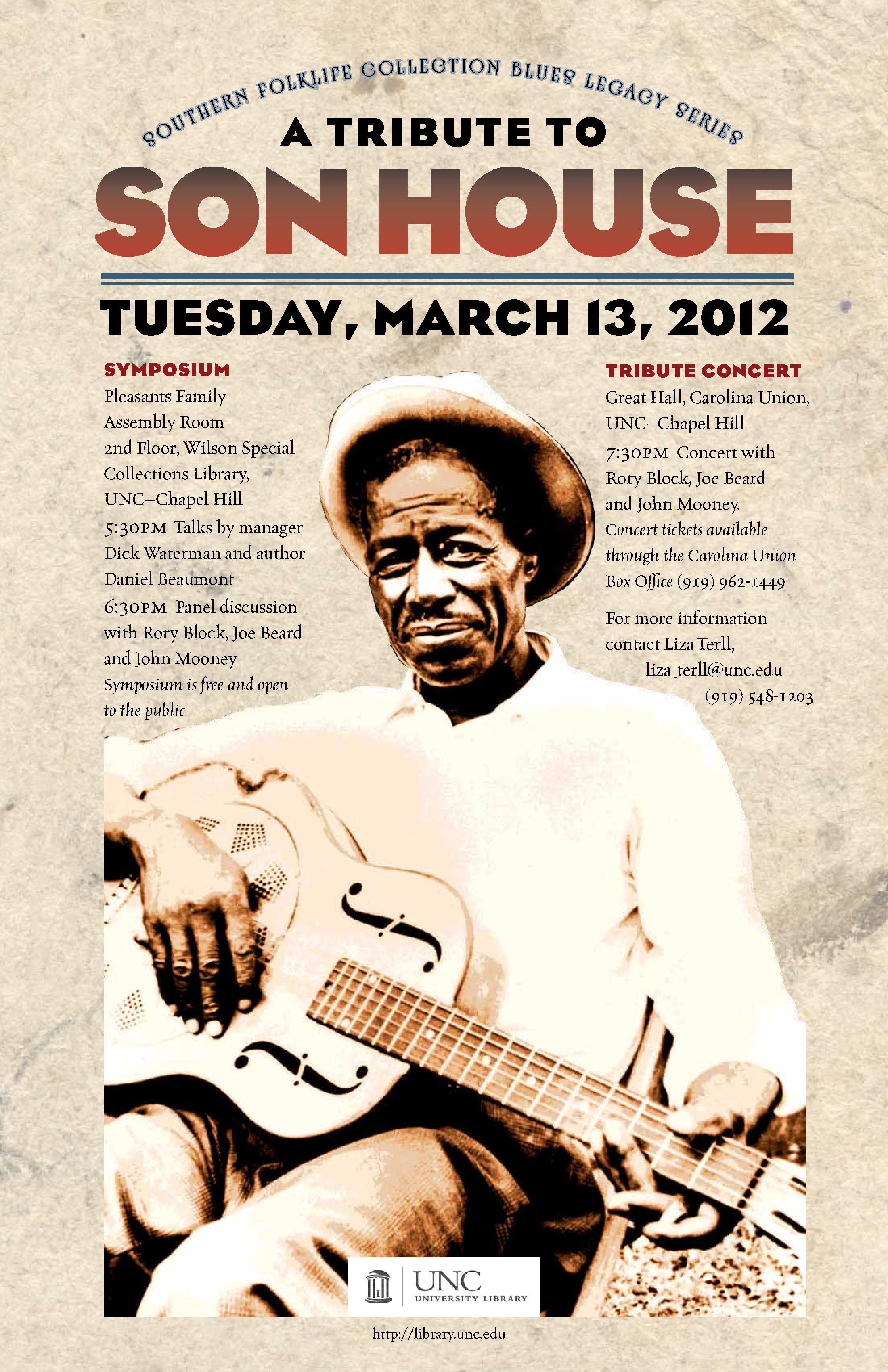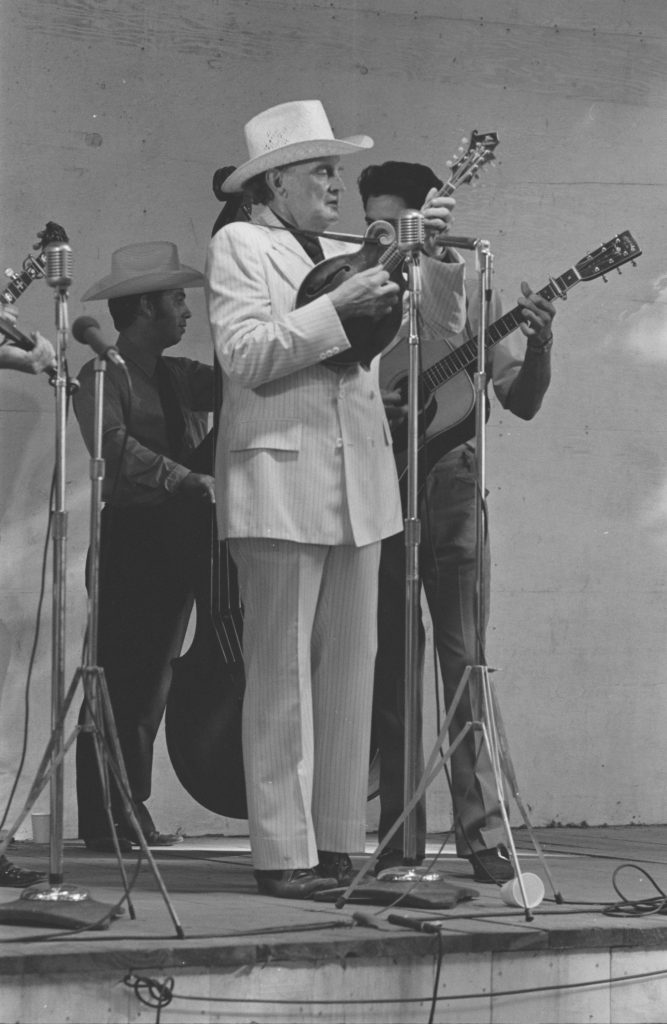
More images from the remarkable photographs in the Alice Gerrard Collection (#20006), this time a selection documtenting Bill Monroe’s Bean Blossom Festival in the early 1970s. 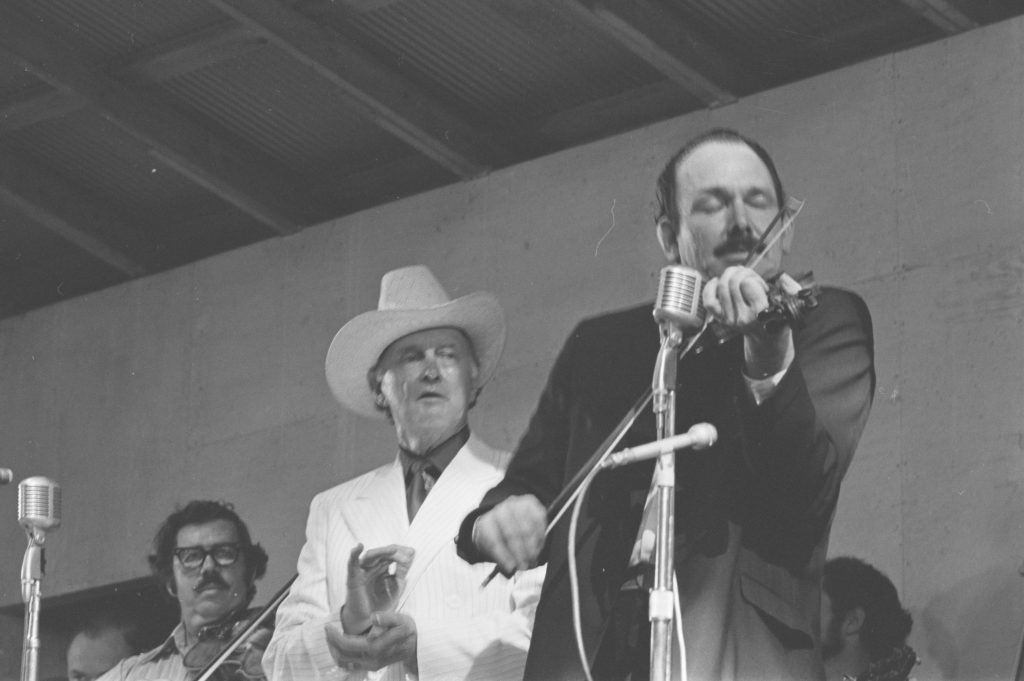
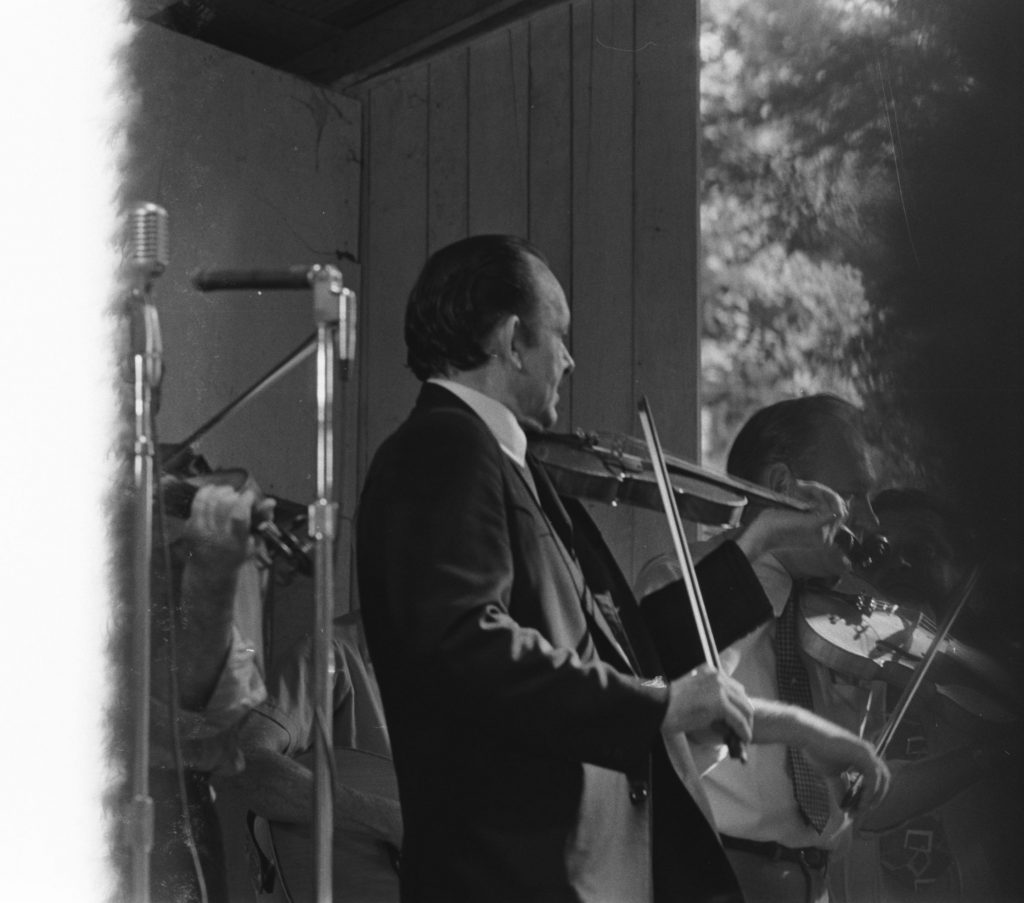

Aaron
Photo of the week: Matokie Slaughter
 The end of UNC’s school year came up on us extremely fast. We are sad to see our student assistants, upon whom we depend to keep the SFC machine running smooth, graduate and go on to other things. We can’t thank them enough. Recently, one of these intrepid employees digitized a great number of photographs from the Alice Gerrrard Collection (#20006). The image above, a beautiful portrait of legendary old time banjo player Matokie Worrell Slaughter, came from a set of 35mm slides.
The end of UNC’s school year came up on us extremely fast. We are sad to see our student assistants, upon whom we depend to keep the SFC machine running smooth, graduate and go on to other things. We can’t thank them enough. Recently, one of these intrepid employees digitized a great number of photographs from the Alice Gerrrard Collection (#20006). The image above, a beautiful portrait of legendary old time banjo player Matokie Worrell Slaughter, came from a set of 35mm slides.
Originally from Pulaski, Virginia, Matokie Slaughter performed with her family on local radio during the 1940s and became a regular at fiddler’s conventions. She is featured on a number of recordings, including a band she formed with her sister, Virgie Richardson, and Alice Gerrard called the Back Creek Buddies.
The SFC holde many recordings of Slaughter in the form commercial releases, like the excellent 1978 County LP, Clawhammer Banjo, vol. 3, and field recordings from the Alice Gerrard and Paul Brown collections. Check back for another photo tomorrow.
Record of the week: Flatt & Scruggs with Doc Watson
 We often have banjos on the mind here at the SFC and having recently pulled out some of our favorite Earl Scruggs LPs we thought it might be nice to share a track. Enjoy some “Jazzing” from the 1967 Columbia LP, Strictly Instrumental, call no. FC-18002. “Jazzing” from Strictly Instrumental, FC18002
We often have banjos on the mind here at the SFC and having recently pulled out some of our favorite Earl Scruggs LPs we thought it might be nice to share a track. Enjoy some “Jazzing” from the 1967 Columbia LP, Strictly Instrumental, call no. FC-18002. “Jazzing” from Strictly Instrumental, FC18002
More photos of the week: Lester Flatt and Earl Scruggs with the Foggy Mountain Boys
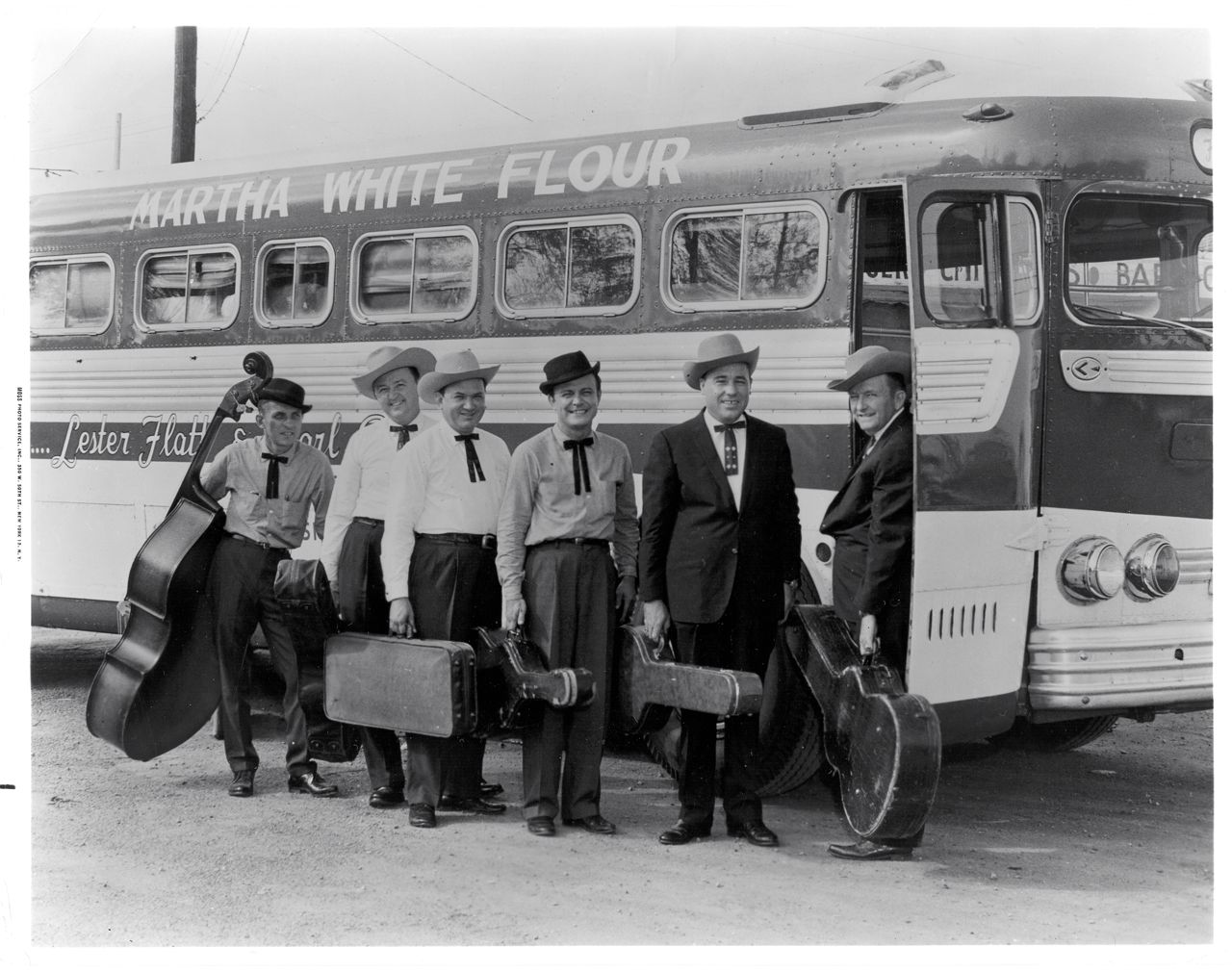 Life as a country musician has never been easy and Earl Scruggs spent grueling years on the road in the late 1940s pioneering the bluegrass sound with fellow road warriors Bill Monroe, Chubby Wise, Howard Watts, and Lester Flatt. After Flatt and Scruggs left the Blue Grass Boys in 1948, the popularity of Bluegrass music began to grow and through the resourceful management of Louise Certain, soon to be Louise Scruggs, the band secured the sponsorship of Martha White Flour and what was hopefully a more comfortable means of transportation. Still between radio performances, recording sessions, and live shows, the band often performed multiple times per day. The image below features The Foggy Mountain Boys on an unknown stage in the 1950s.
Life as a country musician has never been easy and Earl Scruggs spent grueling years on the road in the late 1940s pioneering the bluegrass sound with fellow road warriors Bill Monroe, Chubby Wise, Howard Watts, and Lester Flatt. After Flatt and Scruggs left the Blue Grass Boys in 1948, the popularity of Bluegrass music began to grow and through the resourceful management of Louise Certain, soon to be Louise Scruggs, the band secured the sponsorship of Martha White Flour and what was hopefully a more comfortable means of transportation. Still between radio performances, recording sessions, and live shows, the band often performed multiple times per day. The image below features The Foggy Mountain Boys on an unknown stage in the 1950s.
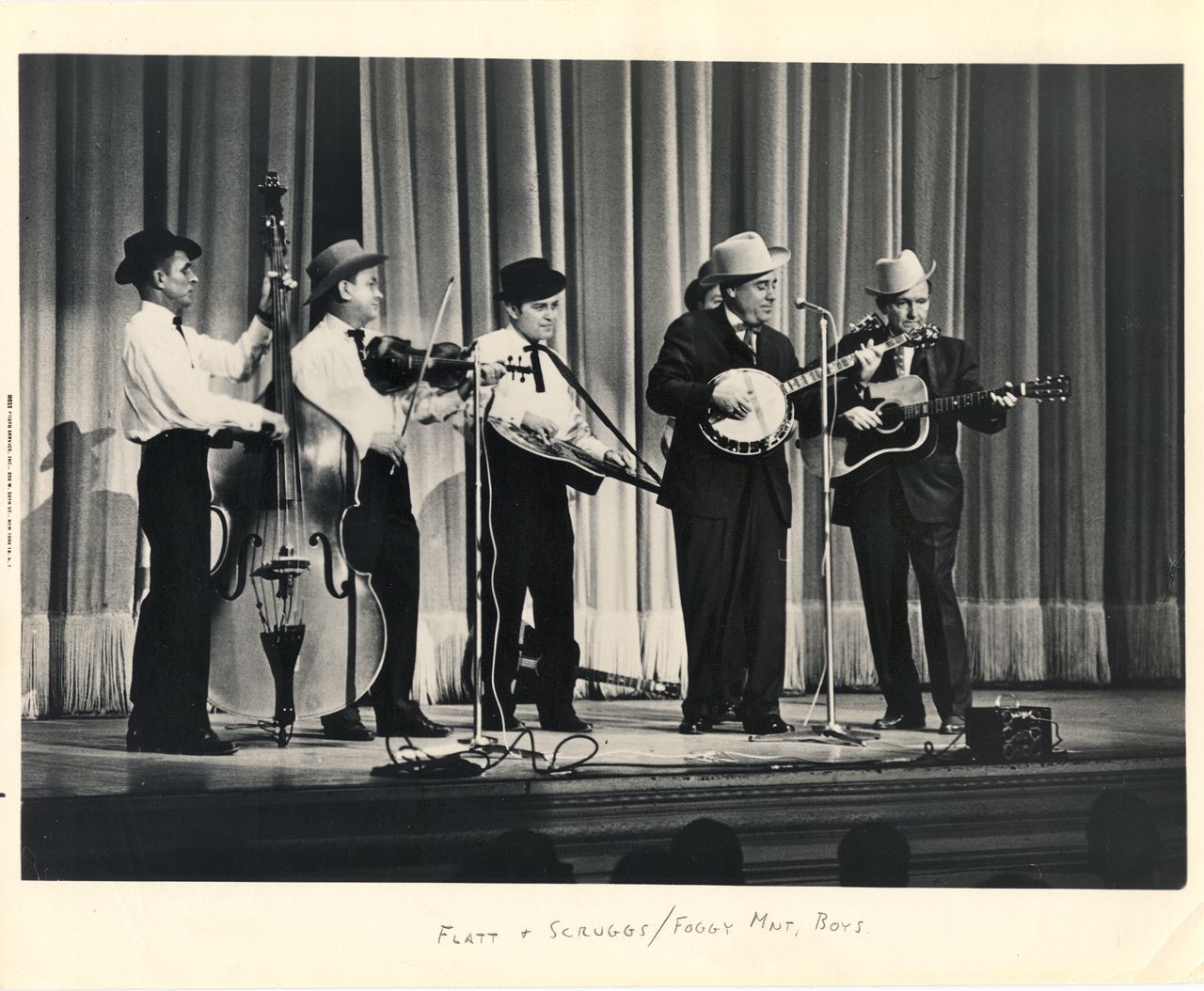
SFC Photo of the Week: Mike Seeger and Elizabeth Cotten
 Another image from the Mike from the Mike Seeger Collection, this time playing guitar with his dear friend, Chapel Hill’s beloved Libba Cotten, in 1978 or 1979.
Another image from the Mike from the Mike Seeger Collection, this time playing guitar with his dear friend, Chapel Hill’s beloved Libba Cotten, in 1978 or 1979.
Join us tonight, March 23, 2012, in Wilson Library on UNC’s campus for a discussion and concert in celebration of the life and work of musician, documentarian, and scholar Mike Seeger.
SFC Photo of the Week: Mike Seeger
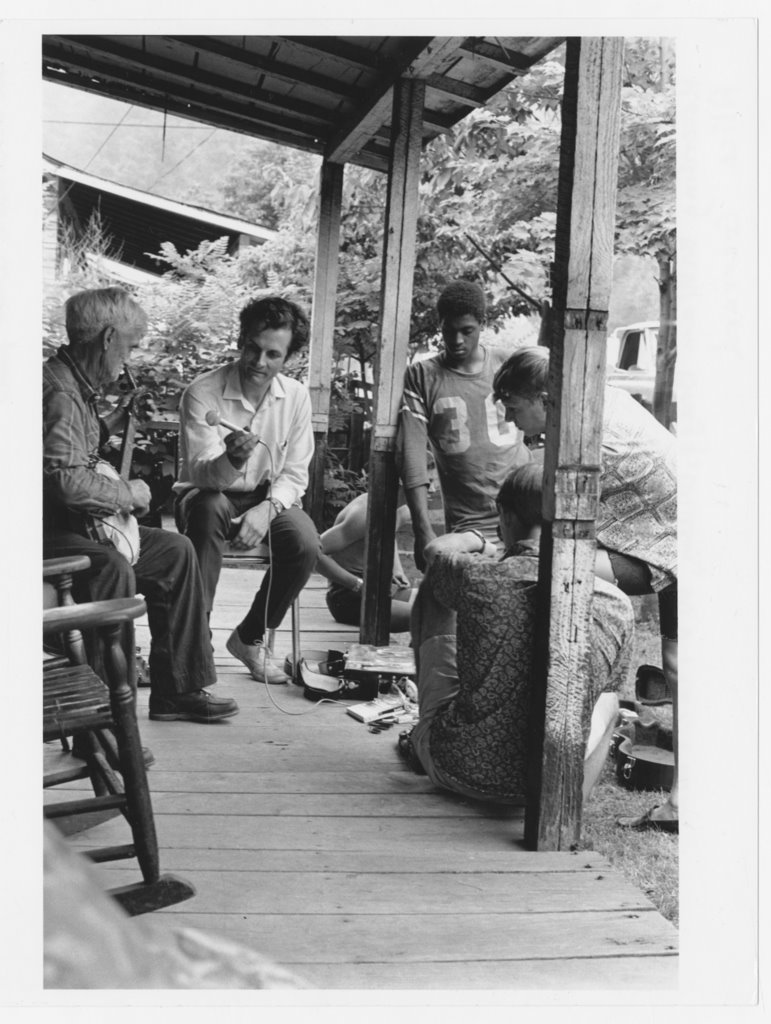
We wanted to share a few photos from the Mike Seeger Collection in advance of the tribute concert and lecture on Friday, March 23. The image above, featuring Seeger recording William Bragg along with a group of interested students, was captured in Widen, West Virginia by Alice Gerrard in 1967.
Gerrard will perform at the tribute concert along with Ginny Hawker and Mike Seeger’s former band mates from the New Lost City Ramblers, John Cohen and Tracy Schwarz.
Music from the True Vine: A Tribute to Mike Seeger
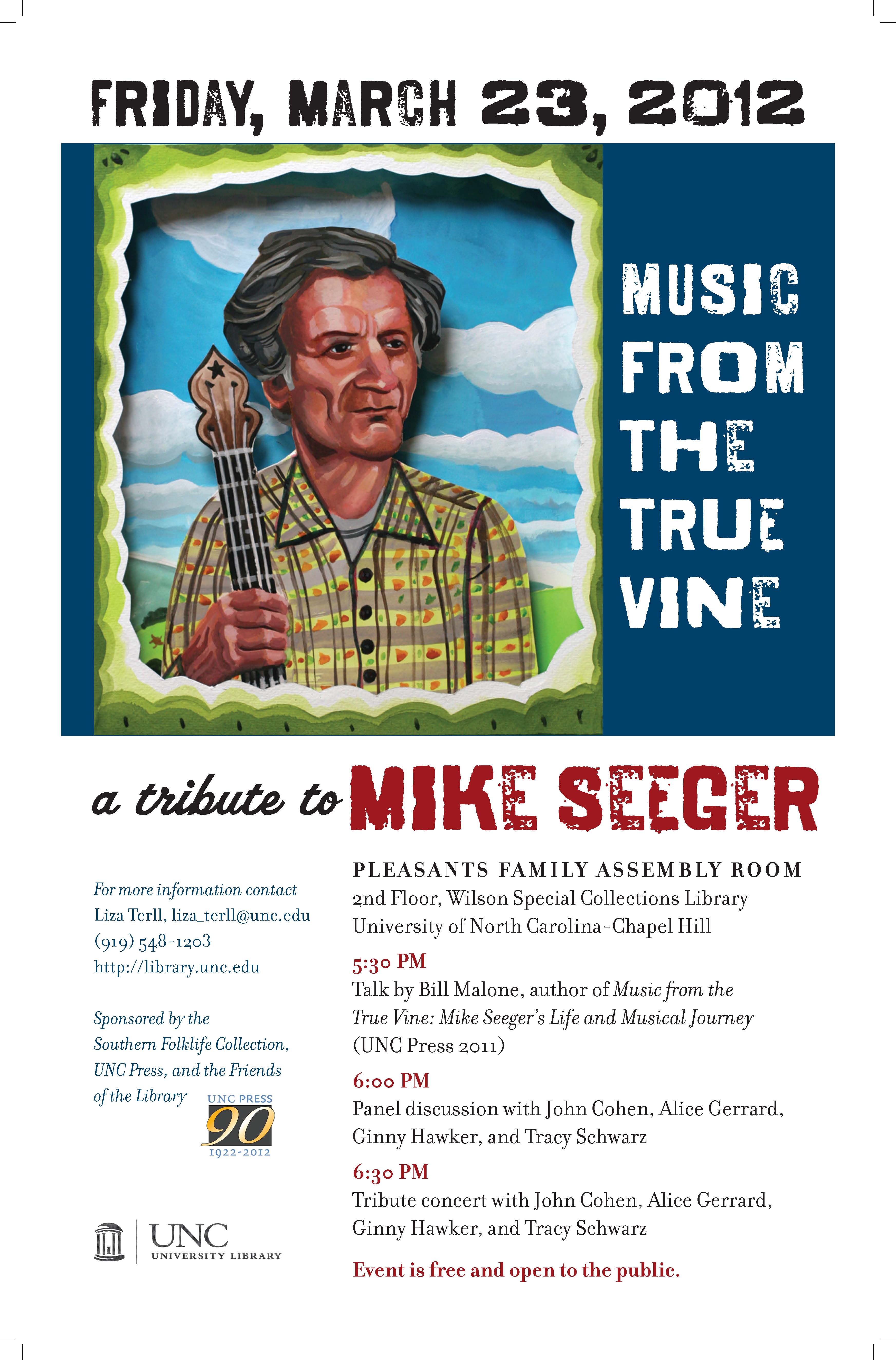
The life of the late musician, documentarian, and scholar Mike Seeger will be celebrated with a tribute concert and lecture at the Wilson Special Collections Libraryon March 23, 2012.
Seeger, co-founder of the folk revival group the New Lost City Ramblers, died in 2009. He was a member of the famous Seeger folk family, along with musician siblings Pete and Peggy Seeger and their musicologist parents Charles and Ruth Crawford Seeger.
The 6:30 p.m. concert will feature musicians who performed with or were influenced by Seeger: John Cohen (a co-founder of the Ramblers), Alice Gerrard, Ginny Hawker, andTracy Schwarz.
Prior to the concert, historian and author Bill C. Malone will give a 5:30 p.m. lecture on his new biography, Music from the True Vine: Mike Seeger’s Life & Musical Journey (UNC Press, 2011). At 6 p.m., Malone will moderate a panel discussion with the concert performers.
Malone, an emeritus professor of history at Tulane University, is known for his studies of Southern folk and country music. Music from the True Vine presents Seeger as a gatekeeper of American roots music and culture, showing why generations of musicians and fans of traditional music regard him as a mentor and an inspiration.
Seeger recorded almost forty albums and was nominated for six Grammy Awards, including three for solo work. He also interviewed and produced field recordings of traditional musicians. The National Endowment for the Arts honored him with a National Heritage Fellowshipin 2009.
The program is sponsored by the Southern Folklife Collection in Wilson Library, which holds the collected papers of Mike Seeger, as well as those of Gerrard and Malone. The Friends of the Library and UNC Press are program co-sponsors.
Books will be available for sale and signing, courtesy of the Bull’s Head Bookshop.
Please join us.
Friday, March 23, 2012
Wilson Special Collections Library, Pleasants Family Assembly Room
5:30 p.m. Lecture by Bill C. Malone
6 p.m. Panel discussion with Bill C. Malone, John Cohen, Alice Gerrard, Ginny Hawker, and Tracy Schwarz
6:30 p.m. Concert featuring John Cohen, Alice Gerrard, Ginny Hawker, and Tracy Schwarz
Free and open to the public
Information: Liza Terll, Friends of the Library, (919) 548-1203
SFC Spotlight: On Texas and March 2
Even after almost ten years living in North Carolina, whenever March 2 rolls around, also known as Texas Independence Day, my thoughts inevitably return to the Lone Star State where I was born and raised. Despite the mythology, misinterpretations, and misinformation surrounding the Texas Revolution, something about the story of Anglo and Tejano delegates joining together to so recklessly adopt the Texas Declaration of Independence at Washington-on-the-Brazos while General Antonio de Padua María Severino López de Santa Anna y Pérez de Lebrón and his troops prepared to take the Alamo has stuck in my head since I first heard the stories in kindergarten. Unlike July 4, I don’t really think of Texas Independence Day as a day of celebration, but rather a day to reflect on the messy and fascinating history of all Texans. Texas independence from Mexico did not benefit the Tejano and Mexican residents of Texas as much as it did the recent Anglo colonists and helped establish a legacy of discrimination that continues to this day, 176 years later. Texas independence also meant the legalization of slavery, outlawed at that time in Mexico, for another 30 years. Still, wandering through the stacks this morning, my mind turned to the sounds of central Texas, well represented in the Southern Folklife Collection, so I pulled a few records to share with you good readers.
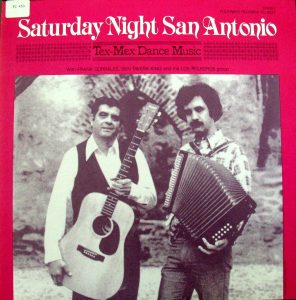
First up is Saturday Night in San Antonio, a 1982 Folkways LP, by Los Polkeros, a duo of Ben Tavera King on three-row button accordion and guitarist Frank Corrales on guitar. A fantastic slab of classic conjunto compositions, the guitar work of Corrales is superb on these recordings. The guitar fell out of favor with conjunto groups in the 1950s, replaced in the typical ensemble by the bajo sexto, but Corrales persisted in the old style of pre-war conjunto guitar accompaniment and his talent for melodic flourishes complimenting the accordion make Los Polkeros’ version of the Santiago Jimenez Sr. composition “Viva Seguin” stand out among the many different recordings of that tune. FC453_Viva Seguin as performed by Los Polkeros
Another favorite, also from central Texas, is the Czech tinged western swing of Aldoph Hofner and his San Antonians [see 78 rpm disc pictured above]. Recorded in 1942, their version of “Alamo Steel Serenade” features the singular steel guitar stylings of Adoph’s brother, Emil Hofner, on the lap steel guitar. Emil, given the nickname “Bash,” played the steel harder and heavier than any of his contemporaries [just listen to the clips below], bending his leads and melodies around the rest of the band’s rhythm driven dance music. 78_4900_178_4900_278_4900_3
In tribute to Joe Thompson: 1918-2012
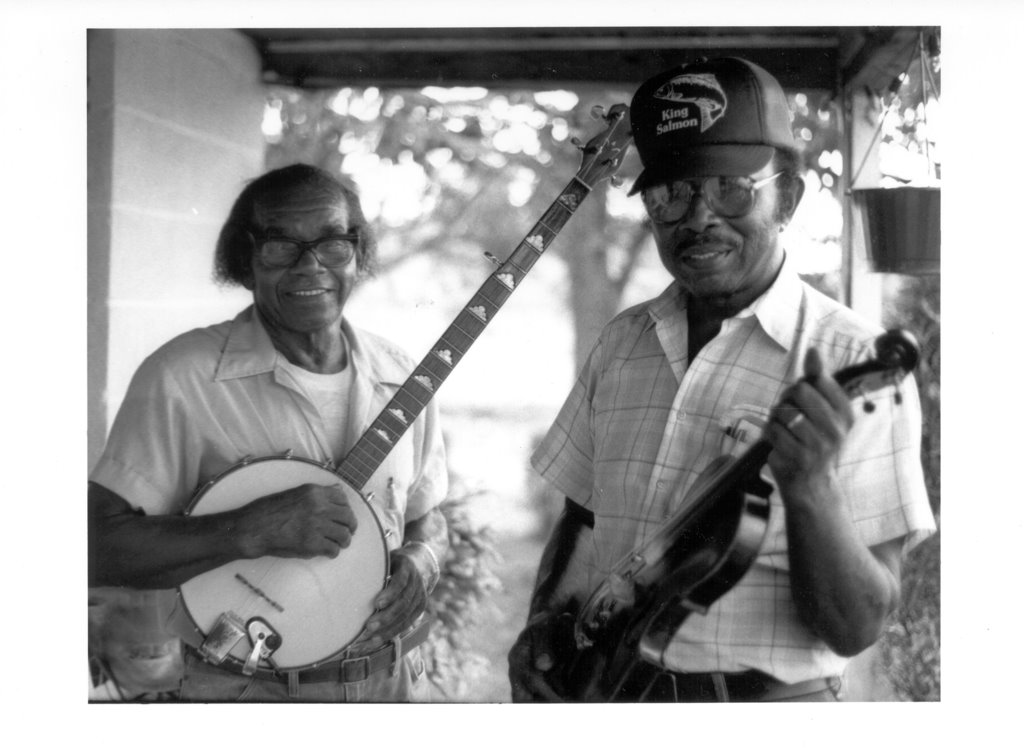
North Carolina master fiddler and musician Joe Thompson passed away on Monday morning, 20 Feburary 2012, at the age of 93. A recipient of both the North Carolina Folk Heritage Award in 1991 and the National Endowment of the Arts Heritage Fellowship in 2007, Joe and his first cousin Odell Thompson performed their own unique style of fiddle and banjo old-time music across the Piedmont throughout most of the 20th century and beyond. It should come as no surprise that the music of Joe and Odell Thompson is well represented at the Southern Folklife Collection, including field recordings, CDs, documentary video, photos and more. We hope to share some of these materials with you in remembrance of Joe Thompson and to demonstrate the impact he had on the history and legacy of stringband music in North Carolina.
Born and raised just north of Mebane in 1918, Joe Thompson learned fiddle and old-time tunes from his father and uncle, Walter and John Arch Thompson. Joe, his brother Nate, and cousin Odell quickly became sought after performers for Saturday night dances for both white and black audiences. Even as interest for old-time stringband music waned in the decades after WWII, the Thompsons continued to play the songs they grew up with. Joe recorded many of these tunes for his 1999 release on Rounder Records, Family Tradition.
In the early 1970s, folklorists like Kip Lornell and students of folklore at UNC began documenting the music of Joe and Odell Thompson, and also encouraging them to perform publicly again. The photo at the top of this post, call no. P4705 from the Tommy Thompson Collection (#20359), possibly shot during a visit to the Thompson home in Mebane in 1974 [UPDATE: Photo by Nancy Kalow, taken in 1988 as part of a project on North Carolina fiddlers with Wayne Martin], accompanies numerous field recordings made by Thompson and noted Appalachian banjo and African American music scholar CeCe Conway. Until Odell’s death in 1994, the duo performed at folk festivals across the country, exposing new audiences to the rich tradition of African-American stringband music many never even knew existed. The following video of Joe and Odell, call no. v8m-138 in the Nancy Kalow Collection (#20113), was shot at a 1988 concert in Gerrard Hall at UNC Chapel Hill.
Joe Thompson continued to perform and record throughout the 1990s and 2000s, but perhaps most importantly, he graciously shared his music and skills with members of younger generations looking to learn. The Carolina Chocolate Drops became Thompson’s most well known protégés, learning from him at his home in Mebane and eventually recording and performing with him at festivals like Merlefest and even local dances. The video below comes from DVD-130, part of the Dom Flemons Collection (#20427). Please enjoy and feel free to share your memories of Joe Thompson in the comments below.




